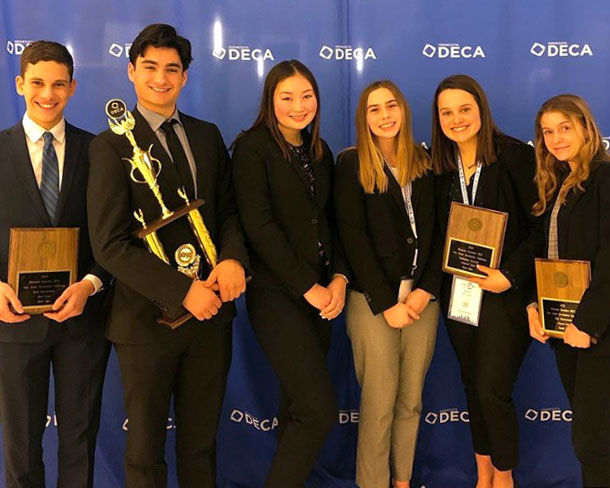DECA competes virtually
Virtual District competitions force students to adapt
Used with permission from Sophia Ross. Juniors Koby Davis, Adin Zweigbaum, Emma Amon and seniors Sydney Ring, Sarah McCallon and Lola Ruff attend the DECA State competition March 3, 2020. They competed against 2,200 people for their placements in their individual events. The next competition will be the International Career Development Conference held in Nashville, Tenn.
January 28, 2021
The stage where awards are distributed is dark and the rooms where judges examine competitors lay empty. This is the reality for DECA members like junior Tashia Johannes, who said her first year of competition has been difficult so far because of the lack of in-person interaction.
“This was my first year in DECA, so I don’t know how things usually run,” Johannes said. “One of the biggest challenges of having DECA completely virtual is that we cannot connect with other participants nearly as easily as it may have been in the past.”
DECA adviser Sophia Ross said she was overjoyed that her students decided to compete even though the competition was virtual this year.
“I’m super excited that students wanted to stay engaged in competition even though it was virtual, because half of the fun about competing is going into this big convention and seeing students from other schools,” Ross said. “The excitement around that is what the students are missing but they have really stuck with this awesome learning experience.”
Junior DECA officer Andre Barajas said he loved that the competitions were shorter than in the past.
“The competition was a lot less taxing since usually, competition takes an entire day where we are all in the same building, but since it was virtual this year it was a lot quicker and we really only had to be working on our competition for about an hour,” Barajas said.
Ross said her role as an adviser has changed to allow the students to be students are much more independent.
“As an adviser I’m learning more from the students this year rather than them learning from me,” Ross said. “They can figure out problems with this technology and so they’re kind of taking the lead and I really love that because that’s an awesome quality to have as a young student and DECA member.”
Johannes said she likes competing virtually because it allows her to build it into her schedule even though the work sometimes feels simple.
“There are definitely some good aspects to being virtual, such as not worrying about commuting and not missing school, but it didn’t feel nearly as much like a competition, and rather felt like another school assignment,” Johannes said.
Barajas said the idea of going back to hybrid intrigues him because it would allow him to see new recruits in-person.
“I look forward to the idea of getting to see people in person and maybe having club meetings in hybrid,” Barajas said. “Also it will be nice to get to meet some of the new members in person since I’ve really only seen them over Zoom.”
Ross said the ability to meet in person will allow them to coach students but probably won’t have an effect on if the state and national competitions are remote.
“When we go back to school we’ll be able to connect with individual students or groups if we need to or we could have our competition practice in person if needed,” Ross said. “However I’m certain that (the) state and national competitions will be held in the same virtual format.”
As of Jan. 28, results and placing had not been released for the district competitions.




